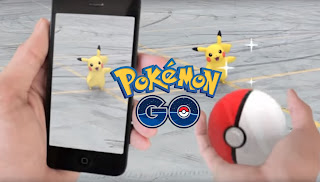Pokémon Go - Game ( Whats,Ifs & buts)
Now a days, you may have heard stories of people hunting down
Pokémon on their
smartphones in bedrooms, offices & even in bathroom.
This catching Pokémon is a new game called Pokémon Go.
You might be thinking what the hell is going on? What is Pokémon Go?
In minor terms, Pokémon Go is
a game that uses your phone’s GPS and clock to detect where and when you are in
the game. As you walk here & there, different and more types of Pokémon
will appear depending on where you are and what time it is. The main idea
behind this is to encourage you to travel around the real world to catch
Pokémon in the game.
What is Pokémon Go?
The Pokémon games
take place in a world populated by exotic, powerful monsters. Pokémon looks like rats, snakes, dragons,
Unfortunately,
Pokémon aren’t real. But technology has evolved to be able to add up a world in
which Pokémon are real. That’s essentially what Pokémon
Go tries to do: By
using your phone’s ability to track the time and your location, the game looks
like what it would be like if Pokémon really were roaming around you, are you
ready to be caught and collected?
Pokémon Go is based on the
original portable games. First, the similarities: There are Pokémon, and you do
catch them. Similarly, there are also gym leaders and other trainers whom you
can fight for fame, glory. You can also add yourself in-game character’s look and
name. In game, you have a professor who helps get you started, particularly by
giving you a Pokémon.
Besides that, the game
makes for you some big changes. In Pokémon
Go, you have to travel around your world and game uses your GPS & clock
to detect your location on the in-game map and decide which Pokémon appear
around you.
What’s more?
Pokémon Go does a lot to make
you explore your real-world environment at different times. E.g., if you go out
to a park, you’ll probably see more grass. If you go near a lake or an ocean,
you’ll be able to pick up more water types. But if you go out at midnight,
you'll see more nocturnal fairy and ghost types.





Comments
Post a Comment